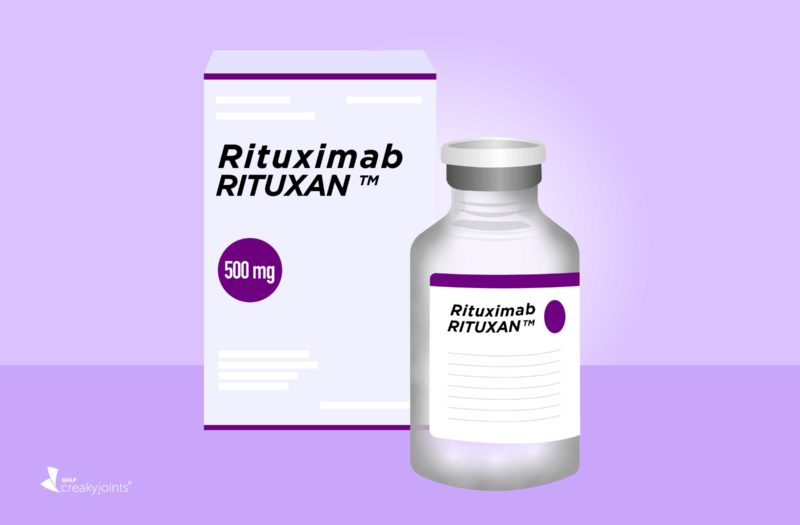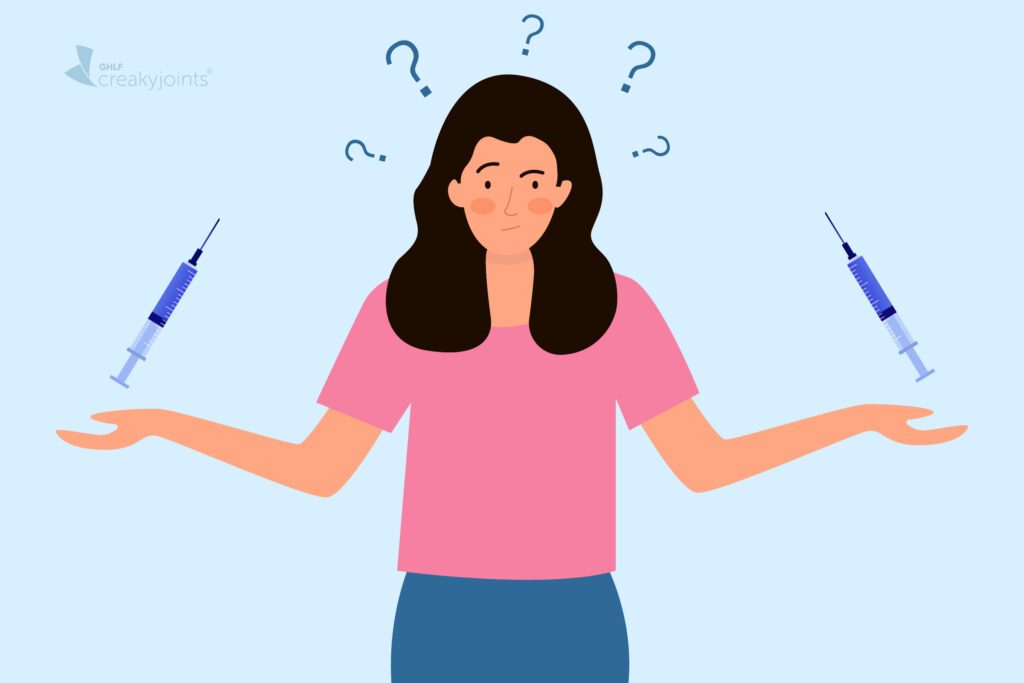Learn more about our FREE COVID-19 Patient Support Program for chronic illness patients and their loved ones.
This has been reviewed and updated as of February 14, 2021.
Since the COVID-19 vaccines from Pfizer and Moderna were authorized for emergency use in the United States in December 2020 (and have been rolling out in other countries around the world), many questions have arisen about whether people who take immunosuppressant medications can receive a vaccine.
The answer is generally yes. Concerns have largely stemmed from the fact that people who take these medications were not included in the clinical trials that led to the vaccines’ authorization. This means there is not yet data on how effective they are in people whose immune systems might function differently because of medication or underlying health issues like autoimmune conditions.
The general consensus for most immunosuppressed patients — based on what is known about how mRNA COVID-19 vaccines work — is that COVID-19 vaccines should be safe for people on immunosuppressant therapy but may be some degree less effective.
Many major medical organizations are recommending the vaccine to people on immunosuppressants. And researchers are starting to collect and analyze data on whether the vaccines have different efficacy or side effects in these patient populations.
We encourage you to check out our main guide: Getting a COVID-19 Vaccine: What to Know If You’re Immunocompromised for a basic overview of the COVID-19 vaccine landscape for people with inflammatory and autoimmune health conditions. You can also read these other resources on COVID-19 vaccines for people who are immunocompromised:
- Can You Get the Pfizer COVID-19 Vaccine If You’re Immunocompromised or Have an Autoimmune Condition?
- Can You Get the Moderna COVID-19 Vaccine If You’re Immunocompromised or Have an Autoimmune Condition
But there may be one potential exception to the “go-ahead-and-vaccinate” advice that many in the rheumatology and autoimmune and inflammatory disease communities are following. And it has to do with a specific biologic medication called rituximab (Rituxan).
If you take this medication, which is approved to treat rheumatoid arthritis, certain types of vasculitis, and certain types of leukemia and lymphoma, as well as sometimes used for lupus and other conditions, your doctor may bring up concerns about timing the COVID-19 vaccine with your rituximab medication schedule.
‘Don’t Get the Vaccine Yet’: Molly’s Story
This is exactly what happened to CreakyJoints member Molly Schreiber, 41, who lives with rheumatoid arthritis and type 1 diabetes and has been on rituximab for almost four years. Molly works at a pediatric hospital in Baltimore, Maryland, where she oversees an obesity management and prevention program. Her role requires her to interface with a variety of health care providers (dietitians, physical therapists, gastrointestinal specialists) and patients (children and their parents).
Because of concerns about her risk for coronavirus complications due to her underlying health issues, Molly has working remotely since the pandemic began last March. But she has been looking forward to being able to go back to work once she gets vaccinated (and enough people around her at work and in the community get vaccinated as well).
In early December, Molly heard that most hospital employees would be able to get a COVID-19 vaccine before the end of the month. She reached out to her rheumatologist to make sure it would okay, given her health conditions and medications.
After some back and forth, Molly’s rheumatologist ultimately advised against receiving the COVID-19 vaccine at that time — specifically because she takes rituximab. “‘You’d be limiting your chance of getting protection from it,’ she told me,” Molly recalls. “Your immune system is so suppressed from the rituximab that the vaccine won’t be effective.”
While her rheumatologist could not cite data specific to rituximab and the COVID-19 vaccine, she was basing her advice based on what’s known about how people on rituximab respond to other vaccines, such as flu, as well as what’s known about how rituximab affects the immune system, especially compared to other kinds of biologics.
Her rheumatologist suggested that if Molly wanted to get the COVID-19 vaccine, it would involve timing it to her rituximab dosing schedule (more on this below).
How Rituximab Affects the Immune System
In rheumatic disease patients, rituximab (Rituxan and MabThera) is prescribed to treat rheumatoid arthritis, certain kinds of vasculitis, and lupus, when these conditions have not improved with other therapies. Rituximab is also prescribed to treat certain leukemia and lymphoma cancers.
When it comes to immunosuppressant medications, it’s important to understand how each one works in the body to affect the immune system and, in turn, reduce inflammation. This is known as a medication’s mechanism of action (MOA). Different mechanisms of action are what can affect things like a medication’s side effects or why certain drugs work better for certain patients and less well for other patients.
Rituximab is a biologic that targets a protein called CD20, which is found on immune system cells called B cells. According to the American College of Rheumatology, B cells are thought to play a role in the development of rheumatoid arthritis.
Taking rituximab depletes (gets rid of) B cells that are circulating in your blood and in your tissues, which helps reduce inflammation. These B cells will regenerate over time, which is why ongoing rituximab infusions are necessary to treat inflammatory conditions like rheumatoid arthritis.
Rituximab is the only approved biologic for rheumatoid arthritis that targets B cells. This is important for understanding why the COVID-19 vaccine may be less effective in people who take rituximab compared with those on other biologics and immunosuppressant drugs (more on this below).
Rituximab is given as an intravenous infusion, typically every six months for rheumatoid arthritis. It can be given more often for certain RA patients, but not usually sooner than every four months.
This is a very different dosing schedule than for other biologics for rheumatoid arthritis. Other drugs are typically taken weekly, every other week, or monthly. (The dosing of rituximab for conditions like vasculitis and cancer is different than for that of RA.)
What Happens When You Take Rituximab and Get a Vaccine
Rituximab depletes B cells, which are a key part of the immune system that help to create antibodies. Antibodies recognize germs and foreign invaders in order to help the body get rid of them before they infect or harm you.
A portion of these B cells have an extended lifespan — termed memory B cells — that are important in having an effective vaccine response, especially over time. So it stands to reason that if you take rituximab, your body won’t mount as full a response in creating antibodies after receiving a vaccine.
While we don’t yet have data about how people on rituximab fare after receiving the COVID-19 vaccine, there is evidence from other kinds of vaccines, such as those for flu and pneumonia.
A 2010 study in the journal Arthritis & Rheumatology found that immune system responses to the pneumococcal vaccine in rheumatoid arthritis patients who were taking methotrexate and rituximab were lower (57 percent of people showed a meaningful rise in antibodies) than in those were taking only methotrexate (82 percent of people showed the increase in antibodies).
A 2013 study in the Journal of Clinical Immunology concluded that the immune response to the flu vaccine was poor among rheumatology patients on rituximab. The authors concluded that “the ability to respond to the influenza vaccine appeared to be related to the degree of B cell recovery at the time of vaccination.” In other words, patients with more B cells — who were likely further out from their last rituximab infusion — had a better response to the flu vaccine.
According to the American College of Rheumatology, “since vaccines are not as effective for several months after receiving rituximab, you should ideally receive necessary ones before starting treatment or between courses.”
Of course, all of this data is based on studying rituximab with other vaccines, like flu and pneumonia. Research will be needed on rituximab and the new COVID-19 vaccines before any definitive conclusions can be drawn about effectiveness.
What People on Rituximab Should Know About the COVID-19 Vaccine
Researchers and doctors may have reason to be cautious about recommending COVID-19 vaccination to people on rituximab without considering their dosing schedule, whereas those same hesitations do not apply to other kinds of biologics.
This doesn’t mean that rituximab is less safe than other biologics, it just means that if you get a vaccine too close to your last infusion, there may be a chance the vaccine won’t provide good protection.
“We should consider medications that deplete B cells separately from other medications for the time being,” says Alfred Kim, MD, PhD, Assistant Professor of Medicine, Pathology, and Immunology at Washington University in St. Louis, Missouri. He is currently overseeing a study to analyze the COVID-19 vaccine’s efficacy and safety in autoimmune patients on different kinds of immunosuppressant medications.
The Importance of Timing Your COVID-19 Vaccine with Your Rituximab Schedule
In new guidance about the COVID-19 vaccine from the American College of Rheumatology, rituximab is one of a select few rheumatic disease medications where experts advise doctors and patients to consider the timing of when you get your vaccine relative to your rituximab schedule, which may help increase the effectiveness of the COVID-19 vaccine. This is the suggested change:
Get COVID-19 vaccine approximately 4 weeks before next infusion, then delay next infusion by 2-4 weeks after second vaccine dose — if possible
Getting the COVID-19 vaccine close to your next rituximab dose — when your levels of B cells would be higher — may allow your body to mount a better response to the vaccine. The schedule would look like this:
- Get rituximab infusion
- Wait 4 weeks before next dose (about 5 months later) and get COVID-19 vaccine
- 3-4 weeks later: Get second COVID-19 vaccine (depending on Moderna or Pfizer)
- 2-4 weeks later: Get next rituximab infusion
This kind of schedule is recommended for patients whose disease activity will allow them to be off medication for an extended period, so it may not be advised for all patients. This is an individual decision you and your doctor need to make together.
Timing the COVID-19 vaccine to her rituximab dosing schedule is one option that Molly has discussed with her rheumatologist. Another would be going off rituximab and switching to a different biologic once enough time has passed. (A six-month window from the last rituximab dose is typically recommended before starting a new biologic.)
But it’s complicated, in part because there’s no guarantee that a COVID-19 vaccine would be readily available to Molly exactly when she’d need it, based on all of this tricky timing. And it would mean taking a sizeable break from rituximab or any biologic. This would most certainly spell an uptick in pain and RA symptoms.
“I typically start feeling bad again after it’s been three months since my last Rituxan dose,” says Molly, who is torn about what to do.
“I feel so lucky to have the opportunity to get the vaccine, and I want to get it. I wish I could just go and get it right now,” she says. “But I’m glad my rheumatologist brought up these issues because I want to do the right thing and make sure the COVID-19 vaccine will actually give me some protection. I had no idea about Rituxan and vaccines until we started discussing it this fall before I got my flu vaccine. People really need to check with their doctors about their personal situation.”
Consider asking such questions as:
- Do you recommend I get the COVID-19 vaccine on my current medication regimen?
- Do I need to get the COVID-19 vaccine at a certain time period in my rituximab dosing schedule (e.g., wait until I am due for my next infusion)?
- Do I need to take a break from rituximab after receiving the COVID-19 vaccine?
The bottom line: If you take rituximab for a rheumatic condition, trying to get your COVID-19 vaccine right before you are due for your next infusion may help increase your immune response to the vaccine. But this is not always logistically feasible or suitable for all patients, especially those whose disease is not well-controlled and could experience complications if off rituximab for an extended period.
If you take rituximab and may soon be eligible to receive a COVID-19 vaccine, talk to your rheumatologist or health care provider about the timing.
Get Free Coronavirus Support for Chronic Illness Patients
Join the Global Healthy Living Foundation’s free COVID-19 Support Program for chronic illness patients and their families. We will be providing updated information, community support, and other resources tailored specifically to your health and safety. Join now.
Bingham CO, et al. Immunization responses in rheumatoid arthritis patients treated with rituximab: results from a controlled clinical trial. Arthritis & Rheumatology. January 2010. doi: https://doi.org/10.1002/art.25034.
COVID-19 Vaccine Clinical Guidance Summary for Patients with Rheumatic and Musculoskeletal Disease. American College of Rheumatology. February 8, 2021. https://www.rheumatology.org/Portals/0/Files/COVID-19-Vaccine-Clinical-Guidance-Rheumatic-Diseases-Summary.pdf.
COVID-19 Vaccination Considerations for Persons with Underlying Medical Conditions. COVID-19. U.S. Centers for Disease Control and Prevention. December 26, 2020. https://www.cdc.gov/coronavirus/2019-ncov/vaccines/recommendations/underlying-conditions.html.
Eisenberg RA, et al. Rituximab-Treated Patients Have a Poor Response to Influenza Vaccination. Journal of Clinical Immunology. February 2013. doi: https://doi.org/10.1007/s10875-012-9813-x.
Hua C, et al. Effect of Methotrexate, Anti–Tumor Necrosis Factor α, and Rituximab on the Immune Response to Influenza and Pneumococcal Vaccines in Patients With Rheumatoid Arthritis: A Systematic Review and Meta‐Analysis. Arthritis Care & Research. July 2014. doi: https://doi.org/10.1002/acr.22246.
Interview with Alfred Kim, MD, PhD. Assistant Professor of Medicine, Pathology, and Immunology at Washington University in St. Louis, Missouri
Rituximab: Principles of use and adverse effects in rheumatoid arthritis. UpToDate. https://www.uptodate.com/contents/rituximab-principles-of-use-and-adverse-effects-in-rheumatoid-arthritis.
Rituximab (Rituxan and MabThera) Patient Fact Sheet. American College of Rheumatology. March 2019. https://www.rheumatology.org/Portals/0/Files/Rituximab-Rituxan-MabThera-Fact-Sheet.pdf.
Rituximab (Rituxan). American College of Rheumatology. February 2020. https://www.rheumatology.org/Learning-Center/Medication-Guides/Medication-Guide-Rituximab-Rituxan.
What is the role of rituximab in the treatment of rheumatoid arthritis (RA)? Medscape. February 7, 2020. https://www.medscape.com/answers/331715-5504/what-is-the-role-of-rituximab-in-the-treatment-of-rheumatoid-arthritis-ra.






